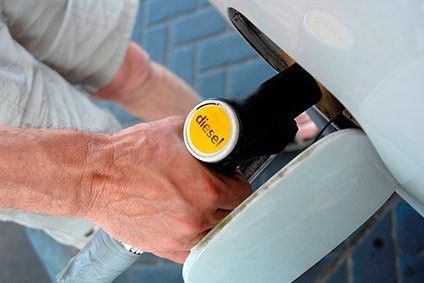
France’s Finance Minister, Bruno Le Maire, is pushing Bosch to increase investment at its Rodez diesel injector factory with the supplier conceding the situation at the Southern France site is “challenging.”
Le Maire met unions in Paris to discuss fears of job cuts at the Rodez facility around 90 miles North East of Toulouse as Bosch said employment at its locations depended on local market and business conditions.

Discover B2B Marketing That Performs
Combine business intelligence and editorial excellence to reach engaged professionals across 36 leading media platforms.
The issue has ratcheted up to the top political level in Paris as concerns surrounding the future of diesel continue to grow following the emissions testing scandal and health, increase.
Le Maire and Bosch CEO, Volkmar Denner were at this week’s (22 January) business summit organised by President Emmanuel Macron in the sumptuous surroundings of the Versailles palace near Paris, with France’s top financial politician voicing his fears about the plant.
“The unions came to Paris a few days ago – I understand their worries because you can really see the diesel sector is in full revolution,” said Bruno Le Maire in comments sent to just-auto from his office in the French capital. “It’s 12,000 direct jobs in France – huge – the Bosch factory in Rodez is one of the largest [with] 1,600 employees.
“I am going to make him [Bosch CEO) two requests: first, that he makes a new investment in one of the two production lines in Rodez. For the moment, that’s not on the table but I would like the Bosch president to make a clear decision on new investment.
“The second thing I would like to have from him is a diversification of Bosch activity in Rodez – today they make diesel injectors – I don’t think that is enough to ensure work.”
The uncertainty surrounding the diesel sector in Europe – after years when politicians lauded it as clean and cheap – comes hot on the heels of the emissions testing furore but also as increasing concerns raised surrounding the health implications of diesel start to filter down to labour bodies.
French union, Syndicat CGT Bosch Rodez confirmed on its website it travelled to Paris for talks lasting around one and a half hours, allowing it to: “Alert the State to the uncertain future of our factory and to make it aware of key messages which appear to us important for the short, medium and long term.”
Last year incentives to swap older diesels for newer – and cleaner – models were among pledges made by automakers at a meeting with German political leaders. VW Group, BMW and Daimler agreed to update pollution control software on as many as 5.3m diesel cars meeting Euro 5 and Euro 6 regulations, a project estimated to cost EUR500m (US$623m) industry-wide.
Major global cities such as Athens, Madrid, Paris and Mexico City are also reported to be studying the elimination of diesel by the middle of the 2020s, but the sector employs significant numbers of people, presenting a large political headache.
“This diesel question is key,” added Le Maire. “There is a transformation of our economy; we want less diesel, customers are using less of it for environmental reasons, so that has to be accompanied by closely following all the sub-contracting diesel industries in France.”
The French Finance Minister added he was already talking to Renault and Peugeot who were “perfectly aware” they had to support the diesel sector as well as be responsible for suppliers.
“That’s also my vision for the economy,” noted Le Maire. “Large businesses are responsible for their suppliers.”
Rodez employees will hardly be heartened however, by Bosch’s response to the question of future employment at the South France factory, with the supplier describing the situation as “challenging,” while also noting it was discussing the site’s “development” with unions and government officials.
“The passenger-car market in France has been in considerable decline for some time now,” said a Bosch statement sent to just-auto. “Employment at Bosch locations depends on how the local market and customer orders develop.
“The current development of the diesel market – which is also affected by public debate and political decisions – means that the outlook for the Rodez location is challenging.
“The development of the location is the subject of regular exchanges with employee representatives and politicians.”
Involvement of France’s top politicians in the Bosch Rodez situation is the first time the French State has stepped in on such a scale since last year when then Economy Minister, Le Maire became closely involved with an industrial dispute involving supplier, GM&S.
Data from just-auto’s QUBE data service shows Bosch operates through four divisions namely: Mobility Solutions (formerly Automotive Technology) which accounted for slightly more than 60% of group revenue in 2016; Industrial Technology (9%); Consumer Goods (24%) and Energy and Building Technology (7%).
The supplier defines its current status as: “We will remain an automotive systems supplier, a strong and above all innovative partner of the automotive industry. But on top of this, we are evolving into a provider of services for road users. To come up with new concepts for mobility, we are also revising our conception of Bosch.”






